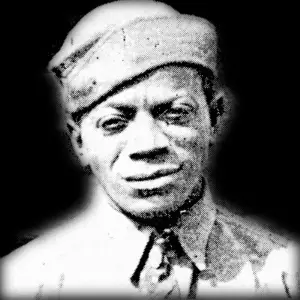JAYBIRD COLEMAN

The first country Blues often featured the harmonica, or mouth harp.
This cheap and portable instrument was a favourite with wandering musicians, or 'footloose bards' as they were known, and the wailing sound of the harp was a distinctive feature of their music, with it's breathy quality of human speech.
'Jaybird' Coleman was one of the first solo performers to record with a harp, which he had been playing for nearly 20 years when he went into an improvised studio in Birmingham AL in July 1927.
Although Jaybird was never particularly famous, his records made a big contribution to the classic sound of the Blues as it developed in the 20s.
Burl C. Coleman was born in Gainesville AL into a sharecropping family in 1896. By the age of 12, he had started to play harp and when he was drafted into WWI he took his instrument with him, and his free-and-easy nature when entertaining his fellow troops got him the name 'Jaybird'.
When he got back to Alabama, he played on street corners for tips, singing and blowing folk melodies, gospel songs and ragtime tunes, and as the Blues grew in popularity throughout the South after WWI, Jaybird added this new music to his repertoire.
Although he was not a spectacular stylist, Jaybird, and other harp players around at the time, developed a technique that echoed the call-and-response 'field-hollers' farm workers would use every day.
This country style of harp phrasing was largely unchanged through the 'jug-band era' and for many years afterwards, until John Lee 'Sonny Boy' Williamson revolutionised harp playing in Chicago almost two decades later.
Jaybird sings 'Man Trouble Blues' in 1927;
By the mid-20s, Jaybird had joined up with the Birmingham Jug Band, where he played alongside guitarist Big Joe Williams. In 1927, he recorded about a dozen solo tracks where he sang with great passion and blew his extended harp lines in response to the vocal part.
These were distributed on the Gennett, Black Patti and Silvertone labels. It is likely that some tracks credited to 'Rabbit's Foot' Williams on the Champion label were also the work of Jaybird. In the days when a record company would pay the artist $50 for a session and then issue the results as they wished, Jaybird was probably 'George Alexander' on the Conqueror label and 'Frank Palmes' when he recorded for Herwin Records too.
Recommended Album
This is some of the earliest country Blues harp on record. Jaybird was a seasoned performer when these tracks were cut in his home-town.
In April 1930, Jaybird recorded a couple of tracks under his own name for Columbia in Atlanta and later that year the Birmingham Jug Band recorded for the Okeh label with Jaybird and Big Joe in the line-up.
By then the Depression had begun to destroy record sales and Jaybird went back to playing on the streets of Alabama's towns and cities.
By the 40s, he had disappeared from the Blues scene altogether, and he passed away from cancer in 1950.